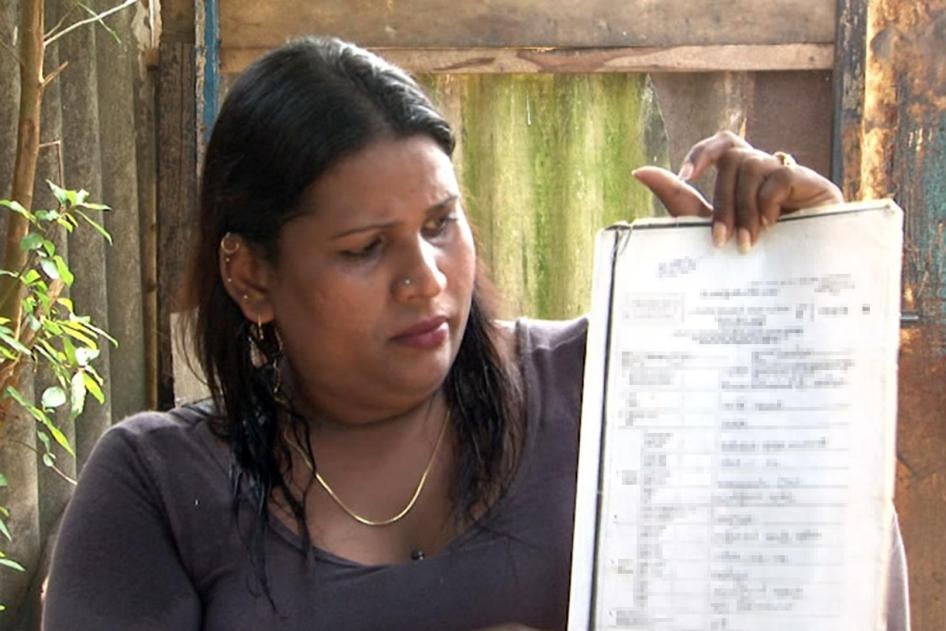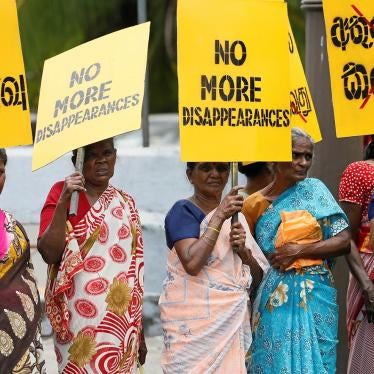“Abeeth” (all names are changed for privacy and security), a young gay man, told us that when he was 17, Ambalangoda police ordered him into a jeep and took him to the beach, where one of them raped him. “I was so scared,” Abeeth said. “I let him do anything.”
Jeewani, a 20-year-old transgender woman, said a police officer in Colombo had raped her when she was 17. The rape was “so, so painful, I screamed,” she said. Neither Jeewani nor Abeeth reported the crimes, afraid the police would abuse them further.
In Colombo, my colleague interviewed Nithura, a 31-year-old lesbian, who said her girlfriend’s father had threatened her with death, but she did not go to the police. “If not for the laws, I would’ve said something,” she said. “I’m a criminal in this country. What’s the point wasting time saying something when the laws are unequal and unjust? I just don’t want to be illegal.”
Sections 365 and 365A of the Sri Lankan Penal Code prohibit “carnal intercourse against the order of nature” and acts of “gross indecency,” commonly understood in Sri Lanka to criminalize same-sex relations between consenting adults, both female and male, including in private spaces. The police use these and vague, outdated “vagrancy” laws to justify arbitrary arrests of people simply because they appear gay or transgender. Their legal vulnerability makes them easy targets for horrendous police abuse.
Other Sri Lankans told us during our research in Sri Lanka in 2015 and 2016, that they had faced discrimination accessing health care, employment, and housing because of their real or perceived gender identity or sexual orientation.
At Sri Lanka’s recent Universal Periodic Review (UPR) in November – a review every four years of the human rights records of United Nations member states at the UN Human Rights Council – the government accepted recommendations to end discrimination against lesbian, gay, bisexual, transgender and intersex (LGBTI) people. In fact, it made a “voluntary pledge” to “Ensure and strengthen respect for fundamental rights of all persons, including those from the LGBTIQ community, and address concerns raised in that regard,” no doubt a result of years of advocacy by Sri Lankan activists.
The pledge is encouraging, but officials have been sending mixed messages. An interim report from the fundamental rights committee of the Constitutional Assembly in early 2017 included draft language prohibiting discrimination on gender, sex, sexual orientation and gender identity among other grounds. The committee also proposed doing away with article 16 of the existing constitution, a bizarre “savings clause” that prohibits constitutional challenges to laws that predate the constitution, some dating to British colonial days. That would allow human rights activists to go to court, challenging sections 365 and 365A as unconstitutional.
But there’s no guarantee that these proposed reforms will survive the constitutional reform process. The Constitutional Assembly has since wavered on including sexual orientation and gender identity in the proposed non-discrimination clause, and it’s uncertain whether removing article 16 will get past an anti-reform lobby.
In its National Human Rights Action Plan, released in early November, the government removed draft language calling for protection on the grounds of sexual orientation, although it did include gender identity. As the Sri Lankan organization EQUAL GROUND has said, “Contradiction of this sort only proves that the Government of Sri Lanka is yet to acknowledge persons with minority sexual orientations as people of the country.” A group of activists delivered a petition to the government protesting the exclusion.
The government has long resisted removing discriminatory penal code provisions that prohibit same-sex relations, and it rejected recommendations at November’s UPR session to repeal articles 365 and 365A, claiming it doesn’t allow discriminatory application of laws. But in practice, the Penal Code and other criminal law provisions are regularly used to discriminate against transgender people and have a pernicious impact on others due to their actual or perceived sexual orientation.
So when, and how, will officials’ lofty promises to protect LGBT Sri Lankans from discrimination bear fruit? The government has made no promises as to when a new constitution will be delivered. The need for change is not abstract, nor is the urgency around decriminalization of same-sex conduct: the lives of people like Abeeth, Jeevani and Manisha, are literally on the line. As long as the Sri Lankan government tolerates discrimination and violence against LGBT people, we can predict further arbitrary arrests, rapes, assaults, death threats, and obstacles to redress.
Deputy Solicitor General Nerin Pulle told the Human Rights Council that the government “remains committed to law reform and guaranteeing non-discrimination on the grounds of sexual orientation and gender identity.”
Such commitments need to be transformed into reality. The government should ensure that the new constitution protects LGBT people from discrimination, and allows legal challenges to preexisting discriminatory laws. In the meantime, it should seek other pathways to protecting LGBT people, including by exercising leadership in mobilizing parliament to pass a bill to repeal sections 365 and 365A. Otherwise, the government bears responsibility for intolerable abuses against its citizens.








